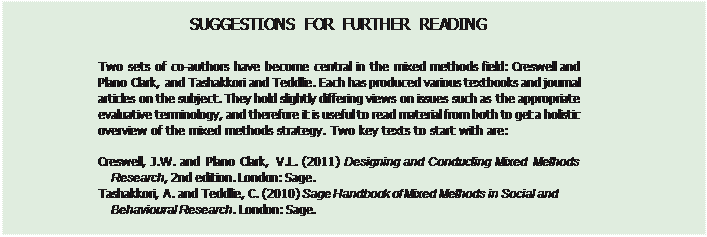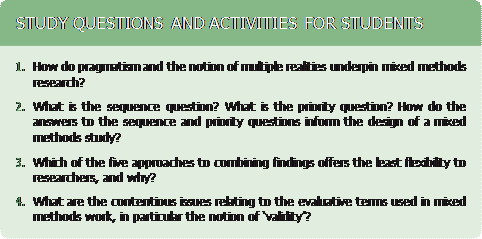 |
Summary and review
|
|
|
|
This chapter has introduced you to the essential elements of mixed methods research and demonstrated how they can be utilized in the criminological arena. We began by looking at the philosophical underpinnings of mixed methods research, namely prag- matism and the notion of multiple realities, before moving on to consider the issue
 of mixed methods designs. We saw how the answers to two questions, the priority question and the sequence question, are integral to the design process in mixed meth- ods work. Next, the focus shifted to combining the data and the five key techniques identified by Greene et al. (1989): triangulation, complementarity, development, initiation and expansion. We then discussed the evaluation of mixed methods research and outlined some of the terminological controversies that have developed in this area. Finally, we described some of the practicalities of actually creating a piece of mixed methods research, from devising a central research question, through developing a methodological approach, to presenting your project and its findings.
of mixed methods designs. We saw how the answers to two questions, the priority question and the sequence question, are integral to the design process in mixed meth- ods work. Next, the focus shifted to combining the data and the five key techniques identified by Greene et al. (1989): triangulation, complementarity, development, initiation and expansion. We then discussed the evaluation of mixed methods research and outlined some of the terminological controversies that have developed in this area. Finally, we described some of the practicalities of actually creating a piece of mixed methods research, from devising a central research question, through developing a methodological approach, to presenting your project and its findings.
 | |||
 | |||

 REFERENCES
REFERENCES
Best, D., Irving, J., Cano, I., Andersson, C. and Edwards, M. (2016) An Evaluation of Intuitive Recovery: Interim Report. Sheffield: Helena Kennedy Centre for International Justice.
Bryman, A. (2006) ‘Integrating quantitative and qualitative research: how is it done? ’,
Qualitative Research, 6: 97–113.
Bryman, A. (2016) Social Research Methods, 5th edn. Oxford: Oxford University Press. Creswell, J. W. and Plano Clark, V. L. (2011) Designing and Conducting Mixed Methods
Research, 2nd edition. London: Sage.
Denscombe, M. (2002) Ground Rules for Good Research: A 10 Point Guide for Social Researchers. Buckingham: Open University Press.
Denscombe, M. (2014) The Good Research Guide: For Small-Scale Social Research Projects, 5th edn. Maidenhead: Open University Press.
Denzin, N. K. (2012) ‘Triangulation 2. 0’, Journal of Mixed Methods Research, 6(2): 80–8. De Vaus, D. (2002) Surveys in Social Research, 5th edn. London: Routledge.
Greene, J. C. (2007) Mixed Methods in Social Inquiry. San Francisco: Jossey-Bass. Greene, J. C., Caracelli, V. J. and Graham, W. F. (1989) ‘Toward a conceptual framework for mixed-
method evaluation designs’, Educational Evaluation and Policy Analysis, 11(3): 255–74. Guba, E. G. and Lincoln, Y. S. (1994) ‘Competing paradigms in qualitative research’, in
N. K. Denzin and Y. S. Lincoln (eds), Handbook of Qualitative Research. Thousand Oaks, CA: Sage, pp. 105–17.
Hammersley, M. (1992) ‘The paradigm wars: reports from the front’, British Journal of Sociology of Education, 13: 131–43.
Harrits, G. S. (2011) ‘More than method? A discussion of paradigm differences within mixed methods research’, Journal of Mixed Methods Research, 5(2): 150–66.
Heap, V. (2010) ‘Understanding Public Perceptions of Anti-Social Behaviour: Problems and Policy Responses’, PhD dissertation, University of Huddersfield, UK.
|
|
|
Layder, D. (1993) New Strategies in Social Research. Cambridge: Polity Press.
Layder, D. (1998) Sociological Practice: Linking Theory and Social Research. London: Sage. Lipscomb, M. (2008) ‘Mixed method nursing studies: a critical realist critique’, Nursing
Philosophy, 9(1): 32–45.
 Maruna, S. and King, A. (2009) ‘“Once a criminal, always a criminal? ” Redeemability and the psychology of punitive public attitudes’, European Journal of Criminal Policy and Research, 15: 7–24.
Maruna, S. and King, A. (2009) ‘“Once a criminal, always a criminal? ” Redeemability and the psychology of punitive public attitudes’, European Journal of Criminal Policy and Research, 15: 7–24.
Mayoh, J. and Onwuegbuzie, A. J. (2015) ‘Toward a conceptualization of mixed methods phenomenological research’, Journal of Mixed Methods Research, 9(1): 91–107.
Mertens, D. M. (2009) Transformative Research and Education. New York: Guilford.
Morse, J. M. and Niehaus, L. (2009) Mixed Method Design: Principles and Procedures. Walnut Creek, CA: Left Coast Press.
Oakley, A. (1999) ‘Paradigm wars: some thoughts on a personal and public trajectory’,
International Journal of Social Research Methodology, 2: 247–54.
Onwuegbuzie, A. J. and Frels, R. K. (2013) ‘Toward a new research philosophy for address- ing social justice issues: critical dialectical pluralism’, International Journal of Multiple Research Approaches, 7(1): 9–26.
Onwuegbuzie, A. J. and Johnson, R. B. (2006) ‘The validity issue in mixed research’,
Research in the Schools, 13(1): 48–63.
Onwuegbuzie, A. J. and Leech, N. L. (2006) ‘Linking research questions to mixed methods data analysis procedures’, The Qualitative Report, 11(3): 474–98.
Onwuegbuzie, A. J., Johnson, R. B. and Mt Collins, K. (2009) ‘Call for mixed analysis: a philosophical framework for combining qualitative and quantitative approaches’, International Journal of Multiple Research Approaches, 3(2): 114–39.
Pawson, R. and Tilley, N. (1997) Realistic Evaluation. London: Sage.
Plano Clark, V. L. and Creswell, J. W. (2008) ‘Methodological selections’, in V. L. Plano Clark and J. W. Creswell (eds), The Mixed Methods Reader. Thousand Oaks, CA: Sage.
Plano Clark, V. L. and Badiee, M. (2010) ‘Research questions in mixed methods research’, in A. Tashakkori and C. Teddlie (eds), Sage Handbook of Mixed Methods in Social and Behavioral Research. Thousand Oaks, CA: Sage, pp. 275–304.
Platts-Fowler, D. and Robinson, D. (2015) ‘A place for integration: refugee experiences in two English cities’, Population, Space and Place, 21(5): 476–91.
Tashakkori, A. and Teddlie, C. (1998) Mixed Methodology: Combining Qualitative and Quantitative Approaches. Thousand Oaks, CA: Sage.
Teddlie, C. and Tashakkori, A. (2003) ‘Major issues and controversies in the use of mixed meth- ods in the social and behavioral sciences’, in A. Tashakkori and C. Teddlie (eds), Handbook of Mixed Methods in Social and Behavioral Research. Thousand Oaks, CA: Sage, pp. 3–50.
Teddlie, C. and Tashakkori, A. (2009) Foundations of Mixed Methods Research. Thousand Oaks, CA: Sage.
Teddlie, C. and Tashakkori, A. (2010) ‘Overview of contemporary issues in mixed methods research’, in A. Tashakkori and C. Teddlie (eds), Sage Handbook of Mixed Methods in Social and Behavioral Research. Thousand Oaks, CA: Sage, pp. 1–41.
Waters, J. (2009) ‘Illegal Drug Use Among Older Adults’, PhD dissertation, University of Sheffield, UK.
|
|
|
Waters, J. (2015) ‘Snowball sampling: a cautionary tale involving a study of older drug users’, International Journal of Social Research Methodology, 18(4): 367–80. literature review

|
|
|


